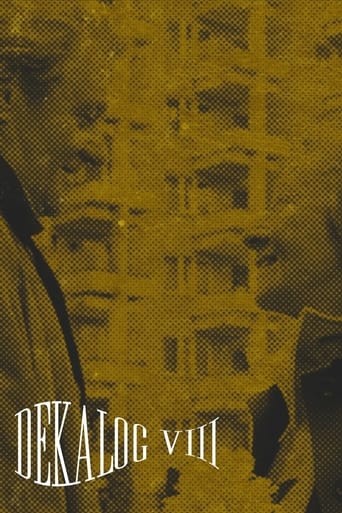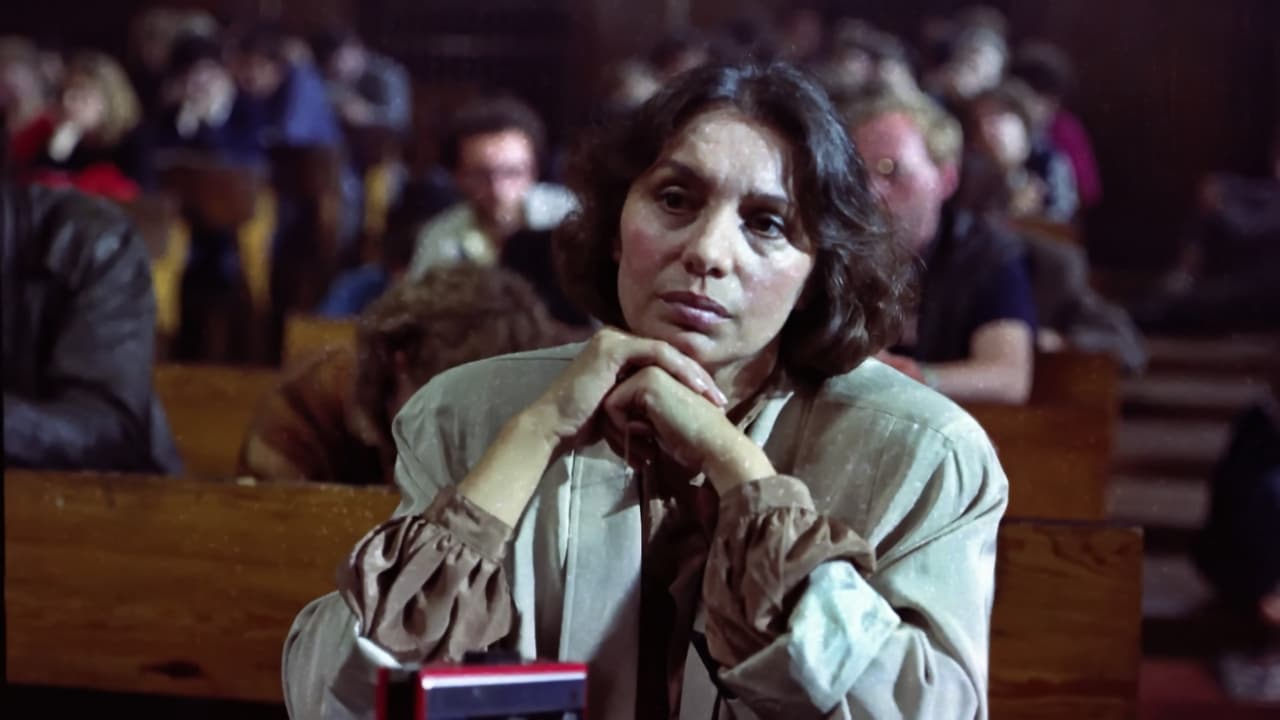chaos-rampant
This is not a particularly remarkable Dekalog. But it's simple and lays out as clearly as any of them the blueprint that Kieslowski worked towards, both in these 10 Dekalogs, the longer short films, and it remains to be seen I guess if he perfects and evolves this for the color trilogy.The twofold blueprint is that we have a world and a story that takes place. The world across the 10 Dekalogs is the same few months in the life of an apartment block, ostensibly the same few months the show aired. Here for example we have the story of Dekalog 2 with the dying husband laid through as something that happened in the same neighborhood.Anyway this world is open-ended and ebbs forward and back with what the protagonists have set in motion around them. The most interesting thing about Dekalog is Kieslowski's ability, snippets of it in TV form, to render that visually as movements in emotional air.The story each time focuses on a moral issue, here it's guilt, tied to the Polish experience of WWII and how it reverberates still. But time and again the story is reduced to two characters forlornly baring themselves to each other in a room, explaining or avoiding to. Bergman.Here we have it clearly: the notion (during a class on ethics) of stories where readers (viewers) have to surmise the motivation of characters. One of these viewers inside the class begins narrating her own story that begs for ethical interpretation: a Jewish girl in need of shelter from Nazi horror who was turned away from a Catholic Polish home.Kieslowski attempts to visually inhabit a corner of this story (no more is allowed by the TV format): the old woman returns to the same WWII home where the story took place, the girl is lost and she looks for her distraught. She was the protagonist in that story, now inhabiting the memory of it.Then we are back in a room where we have a deeper story that explains the former, giving us a plausible ethics that explain what seemed like wrongdoing at the time. This is the same Dekalog effort of setting up a story that they try to deepen later on with more complicated morals. The idea is that we leave these Dekalogs with some insight into the destructiveness of what it means to inhabit a story (the Jewish girl carried that story of wrongdoing with her for 40 years) as well as some measure of realization about the complexity of inter-dependence forces at work behind the stories.But this is too clear, a template on how to write rather than a poem.
FilmCriticLalitRao
Dekalog 8: "Thou Shalt Not Bear False Witness" is a short film which will surely move any human being with heart to tears.By making this film,one of the greatest masters of Polish cinema Kieslowski has given birth to a highly mature work of art which needs to be seen at regular intervals to fathom the true meaning of human existence found in human heart.One can learn that there is no yardstick by which greatness or wickedness of an individual,a society,a nation or a religion can be measured.Everybody has reasons to accept or decline a good action."Dekalog,Osiem" suggests that individual sense prevails sometimes over a good act.Rules have to be broken on some occasions to save precious,human lives.It is a human instinct that old memories cannot be separated from human soul.This is the reason why old memories induce people to visit places where they could have died,see a house where they were hidden,meet a person who saved a life.This short film is remarkable for its depiction of young Polish university students.It is a good sign that young generation have been shown as interested in tackling ethical and moral questions.It is hard to say whether Kieslowski had ideas about the liberation of communist Poland in his mind when he was making this film.
Polaris_DiB
One of the most dynamically dramatic episodes of the Decalogue, this particular story also holds in its dialog the key to what drives a lot of the Decalogue segments along: the study of ethics and motivations. It starts out as a discussed reference to Decalogue 2, self-reflectively mocking the attempt to create ethical drama through cancer-patients, and then leads into a much more personal (is that even possible in this series?) look into the histories of the characters involved.The funny thing is that in this one, the drama has already past... which is necessary for connecting to it the idea of the law, "Thou shalt not bear false witness." How does one know how false witness affects negatively the life-station of the people involved could not really be considered so soon after the fact, but instead needs a lifetime of confusion and personal guilt to show an aged person already suffering her own personal hell.What's most interesting about this one is the irony, especially of an ethics professor claiming that the key to moral absolution comes through the survival of the innocent... and yet it is the survival of a young woman who creates her strongest moral dilemma. That is why this episode is the most self-reflexive, because it cannot of itself willingly claim an absolute understanding of events and moral dilemma.--PolarisDiB
simuland
American Jewish Holocaust survivor returns to Poland to confront the woman who refused to save her from the Nazi's by refusing to falsify her Baptism papers when she was 6 (same age as the little girl of VII). This issue of the long-buried, unresolved/unresolvable hatred of the victim and guilt of the tormentor was much more effectively dramatized by the movie Death and the Maiden. As in VII, so much of the conflict takes place in the past, that the film ends up overly talky, too chatty. As usual, color coding intrudes.Two major problems make the movie specious, morally duplicitous. One, the survivor's physical features, her thick lips, big nose, dark eyes, and coarse black hair, conform exactly to the derisive stereotype of the Jew used in myriad anti-Semitic cartoons dating from the 19th century through the 3rd Reich. It's like casting an African-American who looks just like a cartoon Sambo. Her homeliness stands in marked contrast to the attractiveness of each and every other female in the series. One can only wonder to what degree this was unintentional, unconscious, reflecting an accepted assumed bigotry.Second, just like the contortionist in the park (was he meant to mock the film?), K. bends over backward to exonerate the Pole from guilt. The plot twist of her having received word in advance that the SS was sending out children in need of Baptism papers as decoys is just too convenient (again, that problem of credibility). Her belonging to the Polish underground is even harder to swallow, even more unlikely. What Polish underground? That must have been a really exclusive minority. There was no organized effort by any Polish underground to save Jews; whatever Jews happened to be rescued were done so by individuals acting on their own. To claim otherwise, as K. does, is to lie. Widespread deep-seated Polish anti-Semitism both predated and survived the Nazi invasion; Poles killed Jews even after the Nazi's retreated. To this day they make life insufferable for the scarce Jews who remain in their country. (I have this directly from a Jewish colleague who grew up in and fled modern Communist Poland.)The bonding between victim and tormenter seems a hollow contrivance to evade responsibility. This is the only episode with a pat ending. In fact, it casts all those that preceded in a dubious light. It itself bears false witness.


 AD
AD


